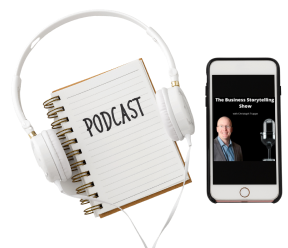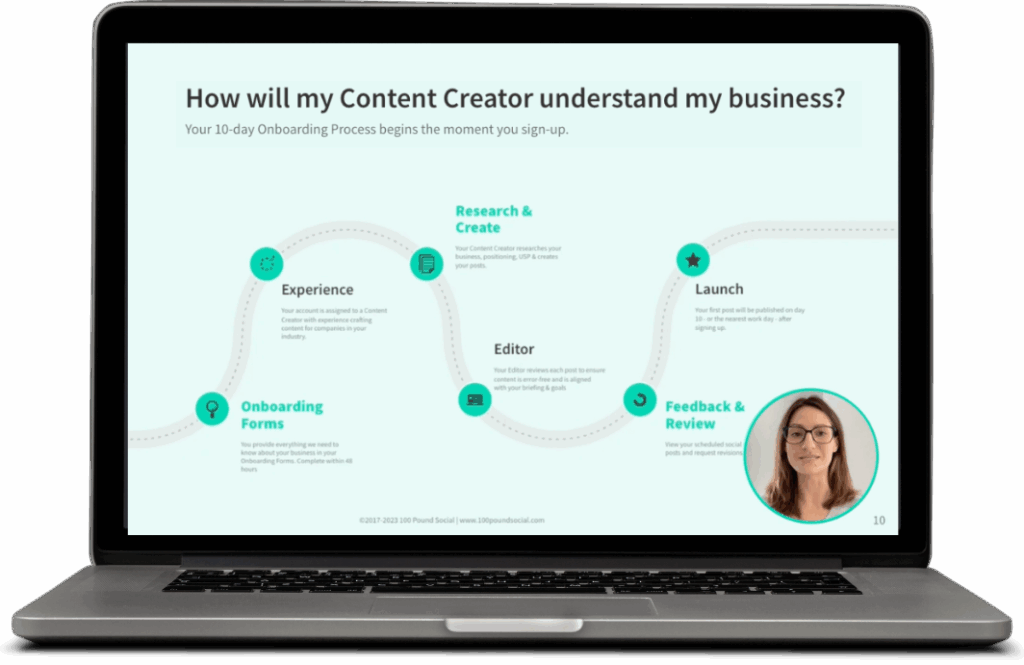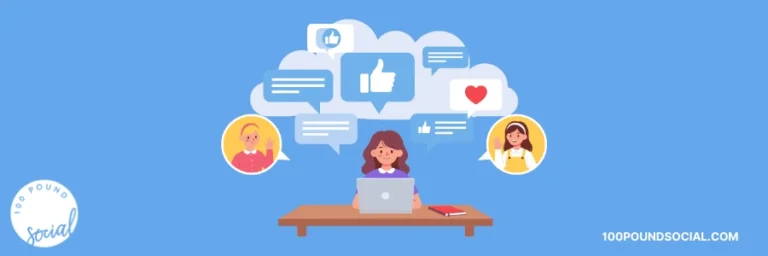The Business Storytelling Show, with Christoph Trappe, has been recognised as one of the top 20 storytelling podcasts. Christoph’s show is also in the top 5% of podcasts worldwide.
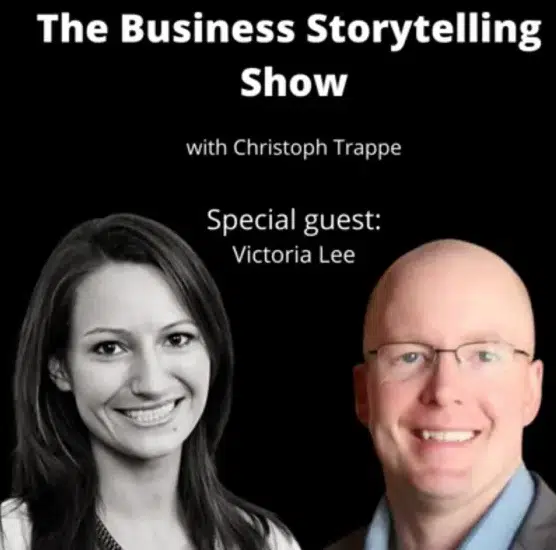
Christoph talks with business owners, thought-leaders and industry experts, sharing advice on how to tell the story of your business to drive growth and results.
100 Pound Social CEO, Victoria Lee, was a recent guest on The Business Storytelling Show, chatting with Christoph on how to build a thought-leadership programme online, and why business owners need to be doing this. Victoria also explained how 100 Pound Social can help time-poor, or socially un-savvy businesses, build up an effective thought-leadership presence on their chosen social media platforms.
Listen now, or read the full transcript below!
“Hey, hey, hey, business storytellers. How’s everyone doing? Thanks for joining me. Let’s get going here and talk about thought leadership. So this is always an interesting topic. But first of all, I just want to say a big thank you to Buzzsumo.com. They just came out with a top 100 content marketers out there, and I made the list at number 66. I don’t know if that’s up or down, or if they had a list before, but either way I made the top 100.”
“So, I guess that’s thought leadership. But importantly, here’s how they found who they put on the list. They looked at who talked about the topic they wanted to create a list around, and they ran it through their system – you know, machine magic! Then they told us who the most influential people are.”
“Some business people out there don’t like the term “thought leadership”, because it’s too esoteric, or whatever. But it does work. It does help us get our brand out there. So how do we do that? Especially when it comes to social media, our websites, everywhere digitally.”
“That’s why I asked Victoria Lee to come on the show. She’s the CEO and Co-Founder of 100 Pound Social, and she’ll give us the scoop. How do you build your thought leadership programme? Why would you want to? And the part everybody wants to know, how long will it take to work? Let’s see what Victoria has to say about the topic. Welcome to the show!”
“Thanks for having me on!”
“I really appreciate you making the time. So first of all, let’s get started with a simple definition here. I’ve got my definition of thought leadership. I know other people probably have their definition. But in your terms, what’s a thought leadership programme? What IS thought leadership? And why should we care?”
“So thought leadership, or a thought leader, is somebody who is leading within their industry. They’re setting the trends on the direction of critical thinking, on the news and topics that are coming up. We should care, because as business owners, thought leaders are often people who are trusted the most. If you’re trying to sell a service around content marketing, you need to be known as an authority on that topic. It helps people trust you, and be willing to invest in you and your brand. So that’s why it’s absolutely critical for entrepreneurs and business owners.”
“No disagreement from me! I do content marketing for a software company, and I run this podcast and live stream, that has grown interestingly. But for the most part, I’m not selling any services. But nonetheless, it’s helping me learn different things, and it’s helped me build my own brand, so certainly I’ve seen the advantages.”
“Now, how do you determine what you need to be a thought leader? The reason I’m asking is, there’s some thought leaders who were considered thought leaders 10 years ago, and now they’re still the thought leaders. It’s like they’re still the thought leader, whatever the new ‘thing’ is. Can you really be a thought leader at everything all the time, on whatever is currently trending? How do we pick the right topic, as a company, to really throw our thought leadership dollars behind?”
“I think it depends on what you’re trying to achieve by building yourself up as a thought leader. Obviously, you want to pick a topic that’s closely related to the service that you, as a business, are selling. The topic you pick should be very, very closely related to your expertise. There’s no point in me turning around and trying to make myself into a thought leader on financial data, because I don’t have the expertise in that area. You’ve got to be authentic. You’ve got to genuinely have expertise in the area. Otherwise, you’re never going to be able to build yourself up. So I’d say pick something that relates to your niche, and pick something that you genuinely have a specialism in.”
“How close does it have to be to what you actually sell? So if I’m selling ads, how much do I talk about ads? Or how much do I talk about related topics? Or what’s the future of ads? I’m picking a silly example here! But do you know what I mean? Like how do I determine what to pick, and how do I determine what to talk about? Maybe it’s hardly ever that I’m talking about the product, right? I’m talking about related things.”
“100%. I think you’ve got to look at all topics around the area of your business that your ideal clients are going to be interested in. You want to be covering those topics in your thought leadership. You might have your central topic, and then you can build around that with anything related.”
“So, we post a lot about social media, and social media marketing, but we also build around that in my content. We talk about long form content writing, video marketing. I talk about things that are on the peripheral to that central niche of social media marketing that I specialise in. I think as long as everything’s related, you can vary off of that central topic, but you need to try to stick to your key message where you’re trying to build up your authority.”
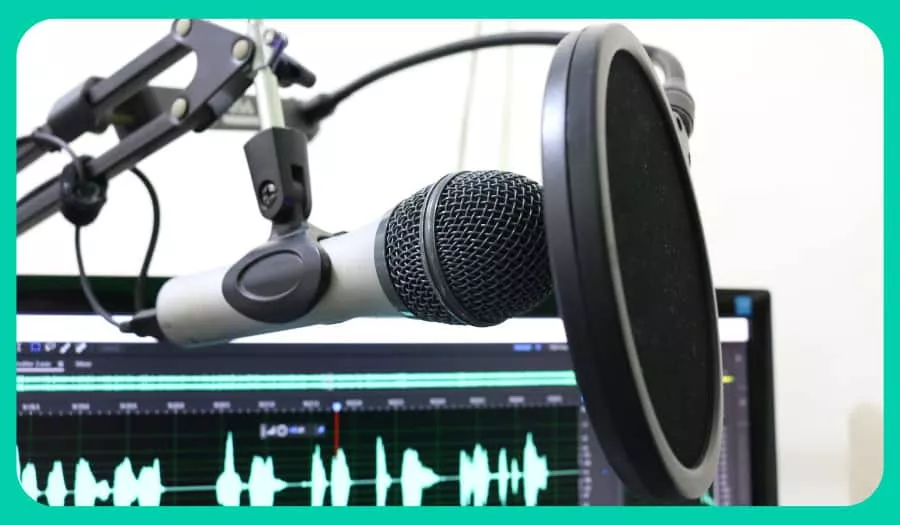
“Of course, your company is 100 Pound Social which refers to the fact that your services are as low as £100, in British pounds, per month. Is that correct?”
“Yes, that’s completely correct. Our basic plan starts at £100 per month. That’s about $135 per month. That’s our social media marketing plan, where our clients get a dedicated content creator and editor, based in the UK, to create and publish their social media content for them.”
“95% of our clients are B2B companies. With a lot of our clients, the reason they work with us is because they want to become thought leaders in their industry. So our writers specialise in creating content that uses their unique, personal, brand voice, and we get that content out across their personal LinkedIn profiles. For B2B companies, using a personal LinkedIn profile is obviously the most powerful way to build yourself up as a thought leader. We aid our customers every day in achieving that.”
“£100, or $135 a month, is super cheap – and this is not a sponsored show today, by the way! I’m just pointing that out because I think that’s really cheap. Now with your work, everybody wants to be a thought leader. Well, maybe not everybody, but most of the people that come to you, and the people that talk to me. They want to be thought leaders. Well, fine, I want to play in the NFL and that doesn’t mean I would get to do that either. Right?! But, how do we move? How do you move people along from “I want to do this” to “I actually can”? At the end of the day, they have to have some thoughts that are leading, I suppose. Right?!
“There’s levels to everything. So, there’s always going to be the biggest thought leader in your industry. And there’s going to be people underneath, who rank a bit lower down, but are still trusted. If you’re putting across any form of authoritative thought in your social media or LinkedIn posts, you are going to build yourself up to be a thought leader.”
“It’s a long term process though. It definitely doesn’t happen overnight. You’ll need to post consistent quality content for 6 to 12 months before you start building up that audience. But at the end of the day, very few people are going to be the ultimate thought leaders in their industry. But if you’re using becoming a thought leader to try and enhance your brand, your sales, or build trust in your business, any level of thought leadership you can achieve is going to be more effective than not putting that effort in. If that makes sense!”
“Absolutely. And 6 to 12 months, that means if you do it correctly, right? If you’re just posting crap, and you guys heard me say this before, crap stands for Content Really Annoying to People, it’s not going to work. So it does take time, it does take perseverance. And it also means taking advantage of the latest networks. I’ll give you an example. Then I’d like to hear what channels you currently prefer for social media.”
“I never thought I would be doing these live streams. I was going to do a podcast, then I decided I should livestream it, because I can get a much bigger audience by live streaming the podcast, right? And it’s live. So there’s all these advantages. Then I determine what are the different channels on offer. We’ll go into Twitch, Twitter, Facebook, YouTube, LinkedIn, sometimes to Amazon, you know, and I’m learning and I’m evolving as I go. So I stream on all these channels – is that all social media? Or what’s your definition of social media, and how do we decide where to play?”
“That’s a really, really good question. So social media, for me, is any channel where you can build an audience, and where you can share your own content. In terms of how you decide which channels you need to be on, LinkedIn, for me, is for all B2B businesses. It’s the strongest channel to be on.”
“The other channels you’re going to invest in depend on your resources. If you’re in a position where you have the resources to get across to all those channels, do it effectively and build an audience, you should do it. 100%. Because you’re going to reach more people.”
“Most companies that we work with, however, and potentially some of your listeners, run quite small businesses, where they don’t necessarily have the time and financial resources to invest across multiple platforms. What I would say is it’s always better to crack one platform, and have a really strong following and authority on that platform, before you try to add more platforms to your list. I’d never recommend starting a strategy to become a thought leader by saying “I’m going to build up an audience on these 6 platforms”, for example, because you’ll find that hard to do. Crack one platform, and then add platforms from there.”
“That’s the classic Joe Pulizzi model. Joe says you’ve got to start with one platform. I don’t know that I always agree with that. I asked him this when he came on the show. I said “I don’t know if I agree”. Because for me, if I’m going to 6 channels, it’s the same amount of effort on the live stream as it is to go to one channel. My podcast, 20 channels, same effort as one channel.”
“But that’s different than posting on LinkedIn, and posting on Twitter. And the thing he said was, “the other thing you have to remember, Christoph, is you didn’t just start, right. How was it when you first started?”. When I first started, I probably only had one channel, maybe two. And then I slowly started building on it.”
“What’s the the danger though, when you focus on only one channel? I mean, I know we’re talking about business here. But this is top of my mind. As an example, I’ve discussed this point a couple of times in relation to OnlyFans – which I know is not what’s business for some people! But they were going to shut it down, so for all the people who were doing the adult content on OnlyFans, that was where they were making their money. They’re very dependent on that one channel.”
“That’s very similar to other businesses – non-adult businesses! If I built my brand on LinkedIn, what happens if LinkedIn all of a sudden changes their algorithm? Or shuts down? Do you know what I mean?”

“Yes completely. It is dangerous, even for a long term business that has been around for years and years. You should never put all of your eggs in one basket, and say, this is the one platform I’m investing in, and I’m doing nothing else. But if you’re starting out, if you’ve got a new business, or even if you’ve got an established business and you’re only just looking to build a social media and leadership strategy, I would start with one platform. But make sure you’ve got a timeline in your strategy where you’re going to build another platform as you go. Because you’re completely right. LinkedIn only has to change the algorithm overnight and it can ruin all your efforts. It’s a really valid point.”
“So when you talk about social media being everywhere you build your audience – a blog, do you count that as social media? Or do you only count platforms like Twitter, LinkedIn, those kind of networks?”
“I wouldn’t count a blog a social media. Some blogging platforms build a following. But I wouldn’t count a blog as a social media platform. Blogging, I would count as a kind of complementary thing to social media. We offer blogging as a service to our clients. The reason we do that is because if they can publish articles on their website, or blog, that complements their social media, we can create much stronger thought leadership posts for them. We can create much stronger social content, if we can link back to really authoritative, long form content that’s on their website. It’s a complementary thing.”
“Absolutely. Now, when you work with clients – walk me through your process. How do you come up with the posts, and how do you know what to say? Do you interview them? How do you help them build their thought leadership?
“We’ve got an onboarding process that lasts 10 days. When a new client comes on board, we get them to complete an onboarding form. It takes them about an hour and a half, and they go through and really break down for us everything we need to know about their company. It covers their brand voice, the type of content they want to be be putting out, the topics they want to be covering. They then have a content creator and editor allocated to work with them. That content creator and editor do their own research on the clients business, and use the briefing that they’ve been given from that onboarding form.”
“From there, it’s their job to put the strategy and the posting plan together for the client. And we build the posts for the client from there. We work with the client on a monthly basis. So we create the content, then the client can have a look, review it, and give us feedback. Then every month on a rolling basis, we get further feedback and updates from the client as we build that posting plan for them. We work in quite a process driven way, and that’s one of the reasons we’re able to offer such a competitive price point to our clients.”
“And of course, if you work with an agency to build thought leadership, that’s fine, but you have to know what’s being posted under your name. So people shouldn’t be pulling this “oh, my agency’s taken care of it”. It’s under your name. I’ll give you an example. And the worst example I’ve ever had for this was this isn’t social media, but the concept applies. I got an email from this company saying “join us at this thing tonight”, and the CEO’s name on the email was very unique. So when the guy sitting next to me had that same name, I recognised him right away. I said, “I just got your email”. And he said, “what email?”. Like, he didn’t know that marketing was sending out an email. And it was a smallish conference. It just really, in my opinion, hurt that company’s and his credibility, because he didn’t even know what was being sent out under his own name. Is that a problem? Or is that just me?”
“That’s definitely a problem. What we find is the clients who communicate with us more, we get better results for. So I’m talking about clients who review what we’re doing, they read every single post, they give us feedback. So if they see something they love, they tell us so we know we can create more posts like that. They see a post where they think “actually that’s not quite right for me”, they tell us so we can adjust and learn from their feedback. Those are the most successful clients, the ones who are on it, unlike this guy you met at the conference.”
“These clients are the ones who get the most out of working with us. We can learn from them, and they can learn from us. The clients we struggle with who are the ones who don’t take 10 minutes a month to give us feedback on what we’re doing. That’s where it can get a little bit difficult, when we’re trying to build up that thought leadership for them without feedback.”
“It’s crazy to me when any person or company spends money on anything, whether it’s an agency or any professional service, and then they don’t take the time to actually make it a success. It’s like if I call a plumber to my house, I’ll talk to them and tell them what the problem is with my toilet, right?! It’s crazy that some people don’t do that. Why do you think that is?”
“I think it is understandable, because we work with entrepreneurs who are starting new businesses, and for a lot of them social media isn’t necessarily the day to day pressing priority. We try and get around that by giving them lots of reminders, lots of opportunities to provide us with feedback in a way that’s really simple and takes the shortest time possible. I completely understand why founders get into that situation now, having founded a company myself. I know in the first year of the company, I probably would have been a bad client, and wouldn’t have given that feedback, because I was too busy. But it’s something that comes with time as you run a business, and you kind of settle into the flow of that.”
“So how much time is involved when you’re building thought leadership, and how much effort, and posting is involved? For example, we currently publish a podcast episode every 2 – 3 days. We have a couple of days where we just record a bunch of live streams. And now I do one about once a week, typically on Wednesdays. But I’m not so sure I know what the right frequency is. Should I publish once a week, should I publish every couple days, it kind of ebbs and flows. So for businesses, if they use LinkedIn, how many times per week or per day should they post, and how deep should the post go?”
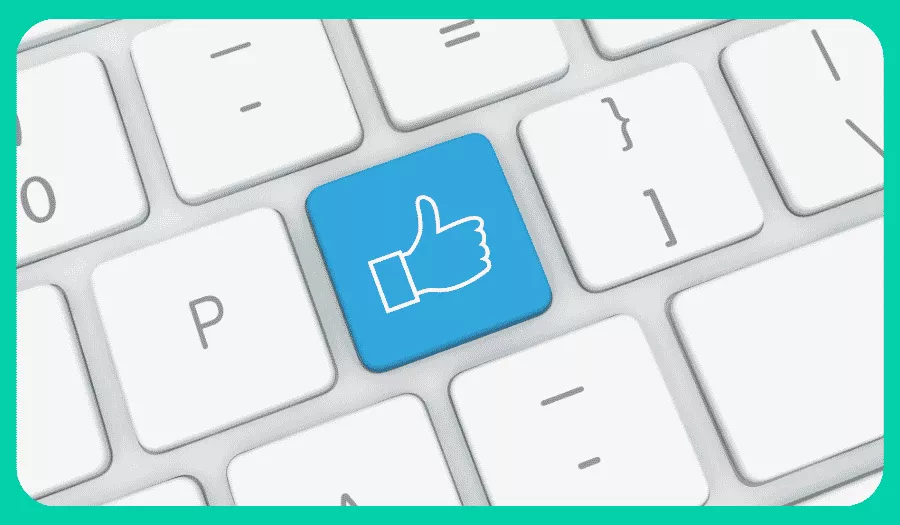
“It kind of depends on what you’re trying to achieve. So if you’re running a podcast, that’s different to if you’re running a SaaS company, and trying to use thought leadership to build up an audience. We tend to recommend to clients that we, or they, need to be posting 3 times a week. Any less than that isn’t enough. Any more than that is fine, but you might over saturate your feed if you post too much in some industries.”
“Again, it’s very client-specific. It depends on their audience and their industry. In terms of the time commitment you mentioned earlier, creating 3 posts a week, if you’re trying to do it yourself as a founder, can take you 2 or 3 hours a week. Depending on the length of the post obviously, and on your experience with writing social media content. The way we do it, we try and make it as time saving for our clients as possible. Our clients typically spend about 15 to 20 minutes a month giving us feedback, and checking over the work that we’ve done for them. But the time involved totally depends on how you decide to do your social media, if you’re going to outsource, or do yourself.”
“It also depends on where you are in the journey. I remember back in the day when I was doing posts for myself, I would write them whenever I had time. And I would always have my wife listen to it, “Hey honey, how does this sound?”. Today it would never even cross my mind to run something by her for feedback.”
“Sometimes the process takes longer, because people want to think about it forever and ever and ever. But here’s the thing, I think all that time counts as well. Like someone saw me sitting in in front of the computer and they said “what are you doing?”. I said “I’m writing”, and they said “but you’re not even typing”. I said “well, I’m thinking about it”. And you know, I know it sounds silly, but that’s all part of the process.”
“So business owners, entrepreneurs – how do they know when it’s time to get started with social? When is the best time to start?”
“I think the best time to start is straight away. If you’re running a business now, and you don’t have a social media presence, that means you’re losing customers to your competitors. Whatever industry you’re in. We work mainly with B2B companies. B2C companies mostly now realise that social isn’t really a choice. You have to be there. Some B2B companies still struggle with social a little bit, with understanding what it is, and why they need a presence. But directly, you need to be on social media, otherwise you’re losing out to your competition.”
“So you’ve got to start right away. B2C, you are marketing to people and B2B, you’re marketing to people who work for a company. They’re still people, right? So they’re still on social. I mean, think about Facebook. When Facebook went down not too long ago, everybody was screaming about how they had nothing to do, some because they couldn’t go on Facebook while they were working. Why do you think B2B companies feel it’s not so much of a priority to get started?”
“I think partly because of the type of social channels that came out. So for a while Facebook was bigger, and that’s more of a B2C platform. Because LinkedIn came a little bit behind Facebook, it’s taken B2Bs a bit longer to realise the value of it.”
“I think a lot of B2Bs also think incorrectly about their target audience. They think that they’re targeting companies, so that when they create a customer persona, they create a persona of the business and headcount of that business. They don’t stop to think that actually there’s a decision maker within that business, who is actually the target customer and is going to make the decision about whether they want to buy or not. So I think there’s that issue.”
“I think that’s also probably the reason that B2Bs often don’t have the experience. They might not invest in a marketing manager from the beginning, whereas B2Cs might be more inclined to do that. What we often find with our customers, is when they go through the onboarding process I mentioned, a lot of them don’t have the customer persona planned out. They don’t really know what their brand voice is. So we try to help them via our onboarding process, to guide them through creating those personas, that brand voice, so that they can tell us exactly who their target audience is.”
“Very, very interesting. Would I make a decision on social, would I make a buying decision? I make buying decisions of all kinds, from different channels. I mean, the other day, I bought a generator from a TV ad. Not directly from the TV commercial, but the ad prompted me to call the company to give me an estimate. And I’m the first person to say TV is dead! But all these things that fly by us all day, they influence us, whether we notice it or not. Right? It’s all in front of us.”
“So Victoria tell us, are we talking about organic only, or do we have to have a paid component in our social strategy?”
“It totally depends on your goal. Organic social, for me, is the strongest. It’s the most authoritative, and if you can build up that audience through your thought leadership, paid social will become less important because you’ll have that real, genuine audience around you. On LinkedIn, posting from your personal profiles, paid social is not necessary.”
“There are some platforms, for example, on Facebook company pages, where I think paid ads are pretty essential. Facebook can deliberately reduce the reach of posts from company pages, so much that you can’t really reach your audience organically. So it’s platform dependent. But if we’re talking about B2B, posting on LinkedIn personal profiles, I don’t think paid ads are essential.”
“Of course, the answer is always “it depends”. In fact, you guys may have seen my T shirt “It depends, most common answer to any marketing question”. Victoria. it was great to have you on the show. I really appreciate you sharing your insights.”
“Thank you so much for having me. It’s been a real pleasure!”
Enjoy the interview? Whether you read or listened, please do leave a review for Christoph and let him know which part you liked most! While you’re there, remember to subscribe to the Business Storytelling Show to be notified about new episodes.
As well as via Spotify, you can listen on Apple Podcasts, Amazon, and more!
Need Help With Your Social Media Strategy?
Grow your business online with 100 Pound Social! Expert social media posts and blog articles.
| Posts Plan | Blog Articles Plan |
| Engaging social media content crafted specifically for your business by your dedicated UK-based Content Creator and Editor team. | Supercharge your social media & SEO content marketing with expert blog articles crafted by your dedicated UK-based writers. |
| Get started now | See more here |
Book a demo call for more information on our services and to learn which of our plans is right for your business.

